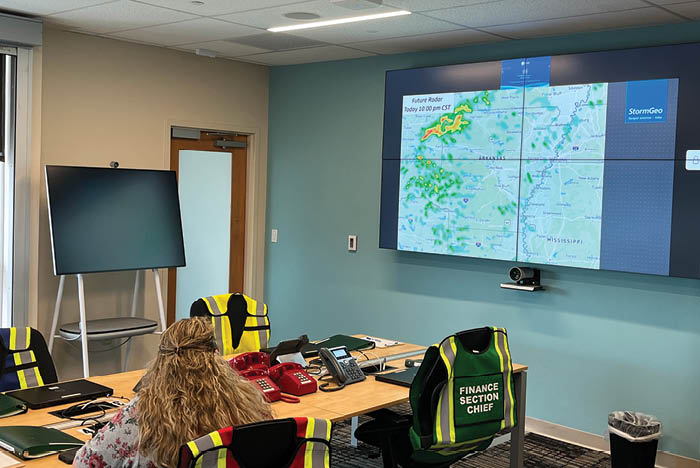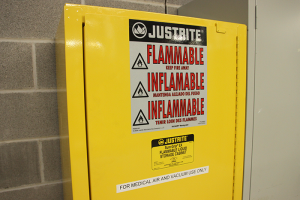Weather intelligence helps hospital

Arkansas Children’s emergency management team members use StormGeo updates to track and prepare for severe weather systems.
Image courtesy of Daren Bolen
Arkansas Children’s Inc. is a health care system solely dedicated to caring for Arkansas’ 700,000 children. The private nonprofit organization includes two pediatric hospitals, a pediatric research institute, a Department of Agriculture nutrition center, a philanthropic foundation, a nursery alliance, statewide clinics, and many education and outreach programs.
One of its hospitals, Arkansas Children’s Hospital in Little Rock, is a 336-bed facility that offers the state’s only Level 1 pediatric trauma center and burn center. Because the health care system is dedicated to championing children’s best interests, it is critical that the system’s hospitals and clinics have an emergency preparedness plan in place.
With locations situated across the state, tornadoes pose a significant risk to Arkansas Children’s. The system’s facilities in Little Rock and Springdale are located in areas that experience strong, long-track tornadoes that move at high speeds. Because of this persistent threat, tornado impacts are consistently scored as one of the top 10 threats to the system in the organization’s annual hazard vulnerability analysis.
Historically, Arkansas Children’s inclement weather plan focused primarily on tornado response. This left a gap in the organization’s emergency operations plan because the area also is susceptible to impacts from winter weather and severe thunderstorms. As a receiving organization for the National Disaster Medical System, Arkansas Children’s also must be prepared for an influx of patients who may be evacuated from areas impacted by tropical systems.
Responding to weather threats involves making decisions that affect the safety and comfort of patients, their families and employees. The decision to move patients to a designated shelter, to set up on-site sleeping accommodations for employees, or to request additional supplies requires coordination spanning multiple departments and moving parts.
Predicting the impacts of severe weather can be difficult. The emergency management team spent late nights monitoring weather apps and watching radar, waiting for potential threats. Lacking the expertise to effectively monitor, interpret and apply weather data from disparate sources was a significant source of stress.
“I think the biggest challenge was that nobody here at our hospitals is a trained, licensed, certified meteorologist,” says Daren Bolen, CHFM, CHEP, emergency management program manager at Arkansas Children’s.
To solve this problem, Arkansas Children’s partnered with StormGeo, a weather intelligence and decision guidance solution that provides weather forecast data, monitoring and alerts specific to each of the locations within a health care system. Since this partnership began, forecast monitoring and alerts from StormGeo have delivered a source of truth to key decision-makers but, according to Bolen, the greatest benefit has been 24/7 access to meteorologists.
“The availability of the meteorologists has really helped us,” Bolen says. “They tell us exactly what we need to be worried about, when we need to be worried about it and what the expected impacts will be.”
Once they better understood how StormGeo could benefit Arkansas Children’s, the team completely rewrote their adverse weather plan. They developed a unified response strategy that considers different weather types and risk levels to map out coordinated efforts for monitoring, communications and responding to various threats.
“There’s a clear, established criterion for each mode of weather,” Bolen says. “Each trigger is based on notifications and alerts from StormGeo.”
After a trigger is met, Bolen’s team follows a list of critical actions, covering patient and employee safety, infrastructure, utilities and transportation. Backed by a comprehensive strategy to respond to any number of adverse weather events and the added confidence of access to a meteorologist, Arkansas Children’s safeguards the health of all who occupy their facilities.




